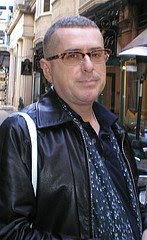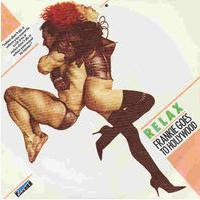
 The group's debut single "Relax" was famously banned by the BBC while at number six in the charts, and subsequently topped the UK singles chart for five consecutive weeks, going on to enjoy prolonged chart success throughout 1984 and ultimately becoming the seventh best-selling UK single of all time (as of May 2006). Following the follow-up success of "Two Tribes" and "The Power of Love", FGTH became only the second act in the history of the UK charts to reach number one with their first three singles; the first being Gerry and the Pacemakers in 1964.
The group's debut single "Relax" was famously banned by the BBC while at number six in the charts, and subsequently topped the UK singles chart for five consecutive weeks, going on to enjoy prolonged chart success throughout 1984 and ultimately becoming the seventh best-selling UK single of all time (as of May 2006). Following the follow-up success of "Two Tribes" and "The Power of Love", FGTH became only the second act in the history of the UK charts to reach number one with their first three singles; the first being Gerry and the Pacemakers in 1964.
Holly Johnson (born William Johnson on February 9, 1960 in Liverpool, England; name on passport William Holly Johnson) is an English artist, writer and musician.  Some sources erroneously suggest he was born in Khartoum, a myth Johnson himself apparently started during an interview. In November of that year, Johnson discovered he was HIV positive. This triggered a temporary withdrawal from the music business and public life in general. His condition was made public in April 1993. In 1994 his critically acclaimed autobiography, A Bone In My Flute, was published.
Some sources erroneously suggest he was born in Khartoum, a myth Johnson himself apparently started during an interview. In November of that year, Johnson discovered he was HIV positive. This triggered a temporary withdrawal from the music business and public life in general. His condition was made public in April 1993. In 1994 his critically acclaimed autobiography, A Bone In My Flute, was published.
Actively involved in the Liverpool punk rock/new wave scene, Johnson played bass with Big in Japan and released several solo singles on the Eric's label, before finding fame as the lead singer and lyricist of Frankie Goes to Hollywood, who enjoyed considerable controversy and commercial success during their heyday in the early 1980s. Some of the band's controversy stemmed from the gay themes of their videos and appearance. Both Johnson and vocalist Paul Rutherford were open about their homosexuality.
Since the mid 1990s, Johnson has worked primarily as a successful painter. His works have been exhibited at the Tate Liverpool, and The Royal Academy. He has contributed to Modern Painters and the Paul Smith sponsored CARLOS magazine. He has continued to make music via his own Pleasuredome label, such as 1999's Soulstream, an album that includes a re-recording of "The Power of Love", Johnson's de facto signature song.
On the B-side to the group's first single, Johnson explained that the group's name derived from a page from the New Yorker magazine, featuring the headline "Frankie Goes to Hollywood" and a picture of Frank Sinatra. An alternate story relates that a similar article about Frankie Vaughan was the source for the group's name. And finally another story is that it was a tabloid story about the British comic Frankie Howerd going to Hollywood. Allegedly the original group named "Frankie Goes to Hollywood" dates from 1980.
The nucleus of the group emerged from the late 1970s Liverpool punk scene. Lead singer Holly Johnson had played bass with Big in Japan, and had also released two solo singles. Paul Rutherford — who did not join until later — had sung in The Spitfire Boys. Local musicians Peter Gill (drums), Jed O'Toole (bass) and Jed's cousin Brian Nash (guitar) initially joined Johnson, calling themselves Sons of Egypt the band secured a number of small local gigs. The group disbanded shortly after only to be partially reprised when Johnson joined Mark O'Toole (bass) and Ped to form FGTH, during a particularly fluid period of personnel changes brother Jed joined on guitar. A female vocalist, Sonya Mazunda, subsequently joined the group, and this line-up performed the first Frankie gig at the Leeds nightclub "The Warehouse", supporting "Hambi & The Dance".
Rutherford, who had been temporarily filling in as backing vocalist for the headlining act, apparently got so caught up in Frankie's performance that he effectively replaced Mazunda that very night. The new all-male musical line-up subsequently toured locally with a leather-clad duo known as "The Leatherpets", and managed to fund promotional videos and demos, despite being eventually turned down by both Arista Records and Phonogram. In October 1982, the group recorded a John Peel session for BBC Radio One, comprising the originals "Krisco Kisses", "Two Tribes", "Disneyland" and "The World Is My Oyster". Around this time Jed O'Toole left the group, to be replaced by the returning Nash.
In February 1983, the group were invited to record a video for "Relax" by the Channel Four show The Tube at the Liverpool State Ballroom. After the broadcast, the Peel session was repeated on radio, and a new session recorded for the BBC, comprising "Welcome to the Pleasuredome", "The Only Star In Heaven" and "Relax". These performances, along with a repeat of the Tube video, apparently convinced Trevor Horn to sign the group for his new label, ZTT Records, in May 1983.
"Relax"
On January 11, 1984, BBC Radio 1 disc jockey Mike Read was playing the record on his show when he noticed the front cover design (by Yvonne Gilbert), depicting a man and woman pressed against each other, back to back, with clothed upper bodies but bared buttocks, and including a somewhat salacious quote from the song's lyrics. This prompted him to listen more intently to the words, and his reaction was such that he apparently removed the disc from the turntable live on air, branding it "disgusting".
Two days later — almost three months after the single's initial release, and just eight days after the group's Top Of The Pops appearance — the BBC banned the record from all its TV and radio outlets.
"Relax" immediately shot to Number One in the UK charts and stayed there for five weeks, leading to the situation where the BBC could not feature the nation's best-selling single on any of their flagship radio and TV chart shows for over a month (hence the traditional closing 'number one spot' on Top Of The Pops was filled by different, distinctly non-number-one acts for five consecutive weeks).
Comparisons were drawn between "Relax" and the Sex Pistols' "God Save the Queen" in terms of media controversy. The BBC had not intended to enhance record sales by banning "Relax", and yet the record had defied these intentions emphatically, meaning that — not for the first time — the BBC and the media were faced with a fast-selling record that could beat and even be seen to exploit a widely-publicised institutional ban. Moreover, the BBC and the UK media were completely unprepared for the unprecedented "Relax" phenomenon that followed. The experience of "Relax" would ultimately prove something of a cultural watershed, causing a marked change in the BBC's policy on banning provocative records, and the popular media's approach to "controversial" records in general.
Read had apparently been outraged by the "overtly sexual" nature of both the record sleeve and the printed lyrics. However, the sleeve's "Relax, don't do it, when you want to suck it to it" had been a deliberately provocative misprint. The real words were, in fact, "...when you want to sock it to it...". On the other hand, the imagery of the concluding expression "Relax, don't do it, when you want to come" seemed rather more inescapable, if no less cryptic in some quarters (when Johnson was asked by pop magazine Smash Hits "'Relax, don't do it' — Don't do what?", he had replied "don't relax, of course").
The original video depicted a gay S&M den (filmed in an unused South London theatre), and was apparently promptly banned by both the BBC and MTV, resulting in a substitute video directed by film-maker Brian De Palma to coincide with the release of his film Body Double. A slightly different version of the video appears in Body Double as a scene from a pornographic movie.
The provocative notes on the back of the "Relax" sleeve were attributed to music journalist and ZTT associate Paul Morley, who was also responsible for the PR campaign that followed the BBC ban, and which led to a massive demand for both the band and the banned song. Part of this promotion (although it actually came later in the year, with the release of "Two Tribes") included the iconic "Frankie Say Relax Don't Do It" T-shirts, which were credited to Morley but were in fact based on designs by Katharine Hamnett, who had produced similarly minimalistic black-on-white shirts depicting positive slogans such as "Choose Life" and "Go Go", as worn by Wham! in promoting "Wake Me Up Before You Go-Go". "Frankie Say..." T-shirts would become ubiquitous in the UK during the summer of 1984.
Adding to the controversy surrounding "Relax", rumours began to circulate after its chart success that the single had actually been recorded by session musicians. This rumour eventually gelled into the general accusation that "Frankie cannot play", since the group were unavailable for touring duties during the whole of 1984. Some time later, producer Trevor Horn admitted that in fact he had recorded a 'demo' version of "Relax" with FGTH and The Blockheads, the renowned backing group for New Wave icon Ian Dury. He had then cut a second version with FGTH alone, but was unhappy with the result of both sessions, and had finally taken the tape away to work on. Horn allegedly spent five more weeks augmenting the track with extensive overdubs by session musicians, incorporating previously recorded bass hooks by the Blockheads' Norman Watt-Roy and a bass pulse sampled on a Fairlight CMI two years earlier at Battery Studios by session bassist Mark 'Thumbs' Cunningham. Despite apparently unilaterally spending such extensive time and money on one single, Horn would later assert that "Relax" represented a massive gamble for himself and his new record label, ZTT, and that its failure could well have bankrupted him. By the time it was completed, it had cost a reported £70,000 in studio time alone, with the video clip costing an additional £15,000. The question of studio time, costs and who should ultimately pay for them would become a key question for FGTH (and other signed ZTT groups such as Propaganda) beyond 1984.
"Two Tribes"
"Relax" remained in the charts when the follow-up, "Two Tribes", was released in May 1984. The anti-conflict song was given an aggressively topical nuclear war slant. Featuring sirens, the unmistakable voice of Patrick Allen (who had voiced the British Government's actual nuclear warning ads, Protect and Survive, two years earlier) and another innovative electronic backing, it went straight into the UK charts at Number One and stayed there for nine weeks (the first single to do so since Wings' "Mull of Kintyre" during 1977–78), with total sales exceeding 1.5 million copies and becoming one of the top 30 best-selling records in the UK ever.
"Welcome to the Pleasuredome"
The album's title track, "Welcome to the Pleasuredome", was released as a fourth single in March 1985. Early promotional posters for the single cockily proclaimed it as "their fourth number one", even prior to the single's release. Embarrassingly, the single peaked at Number 2, leading to preemptive claims that the band was now on the decline. The snipers would eventually prove correct, but not for the alleged 'failure' of a Number 2 hit. The band's demise was, in the final analysis, attributable to increasing internal tensions and general disillusionment, suspected by some during 1985, but only becoming truly apparent during the group's 1986 public and much-heralded "return". The twelve inches were noted for their long Greek mythology/Samuel Taylor Coleridge spoken introduction by Geoffrey Palmer.
Return and decline
In 1986 FGTH appeared at the Montreux Rock Festival which was broadcast on UK television. This performance saw the first airings of two future singles, namely "Rage Hard" and "Warriors of the Wasteland". Both versions were different from the versions eventually released. In August 1986, the long-awaited new Frankie Goes to Hollywood single, "Rage Hard", was released, reaching number 4 in the UK. Initially showcased promotionally with songs like "Warriors of the Wasteland", the group's sound had developed a significantly harder edge with a less flamboyant, more nitty-gritty lyrical side. Whilst the single was inevitably promoted as a flagship ZTT product, the result seemed somewhat forced and verging almost on self-parody by 1986. The corresponding album, Liverpool (originally rumoured to be titled "Liverpool ... let's make it a double"), released in October and reaching UK No. 5 was generally panned by the music press, and chart returns declined rapidly with the follow-up singles "Warriors of the Wasteland" (#19) and "Watching the Wildlife" (#28). The group meanwhile threatened to implode of its own accord, in the course of an otherwise successful tour promoting the new album. Johnson kept himself markedly separate from the rest of the band when offstage at this period, tensions becoming exacerbated during a backstage altercation between Johnson and O'Toole at Wembley Arena in January 1987, reflecting the generally collapsing relationship between lead singer and the rest of the band. FGTH would complete the tour, but Johnson ultimately left the group thereafter, citing musical estrangement.
Later years
The band's name lived on to the extent that re-issues of "Relax" and "The Power of Love" both returned to the UK Top 10 in 1993. Remixes of "The Power of Love" (which became a dance anthem from its original ballad format) and "Two Tribes" were Top 20 hits again in 1997, while "Welcome to the Pleasuredome" also got commercially successful remix treatment, to the extent of a Top 20 placing four years earlier. ZTT continues in its endeavours to keep the FGTH back-catalogue alive into the new century, with periodic reconfigurations, remasters, and further remixes by an ever-growing pool of dance producers, in an attempt to maintain a perceived tradition that began with the multiple variations of the "Relax" 12-inch issued in 1983. ZTT has tended to date (May 2006) to keep all images of the band absent from their remix artwork, and this absence has tended on the whole to extend to the content and spirit of their reissued product.

*Wikipedia

No comments:
Post a Comment